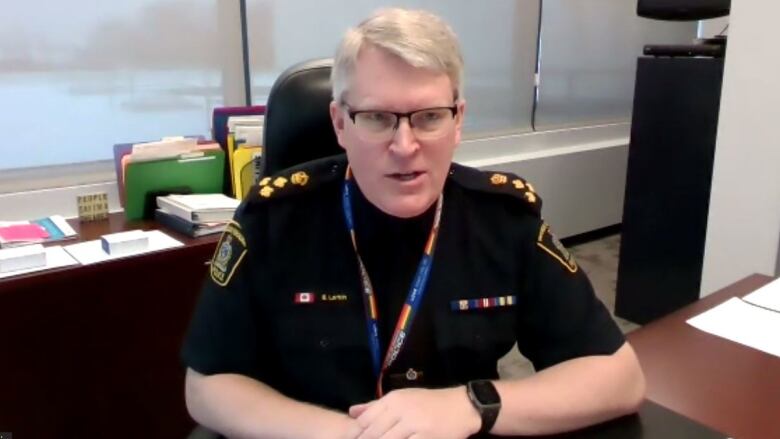No, police won't stop you for being outside your home during stay-at-home orders: Chief Larkin
'The reality is we will, at face value, listen to individuals,' Larkin says

People will not be pulled over by police or stopped on the street for random checks during the provincial stay-at-home orders, Waterloo Regional Police Services Chief Bryan Larkin says.
Instead, officers will focus on people "that overtly endanger the lives of our community and citizens thatput our healthcare system at risk."
"I want to be very clear that there is no authority for randomized approaches to stopping individuals and/or vehicles under this under this legislation," Larkin said during an online media briefing Thursday. "Our police service will not be stopping cars for the sole purpose of checking to see whether or not somebody is making a trip for an essential reason."
Larkin explained officers may ask people who are pulled over for other reasons, such as speeding, why they are outside their homes.
"We do have the ability to request identification and/or somebody's name to enact a judicial process. But it is not our purpose or our interest in randomize stops," he said.
If you are stopped by a police officer, you are within your rights to ask the officer for identification. This is important in light of several instances last spring where people were pulled over by fake police officers.
Larkin says an officer would ask for a person's driver's license and vehicle registration. Some companies are offering letters to employees, particularly delivery drivers who may make several stops, but this isn't necessary, he said.
"The reality is we will, at face value, listen to individuals," Larkin said. "We recognize that when somebody is out walking their dog, they're generally walking their dog."
Focus on people not complying
There have been questions about how the stay-at-home orders will impact low-income and racialized communities already hit hard by the pandemic.
Kitchener Centre NDP MPP Laura Mae Lindo, whois also the party's anti-racismcritic, told CBC Londonit's inevitable that racialized people will be stopped more than those who look white.
"We know that racialized people are primarily the ones working in the factories that have been deemed essential. We know that racialized people are primarily our nurses, are our frontline health care workers that are doing home care with elders in community," Lindo said.
Larkinsaid the legislation is designed to "target those that overtly endanger others."
"I don't believe that the mass population and the general population, including members of our Black, Indigenous and people of colour communities, are actually endangering and setting out specifically to endanger others," he said.
"We do have, you know, those that refuse to accept science and refuse to mask up and refuse to comply. Those are the ones that actually cause greater concern around the spreading the virus and actually putting others at risk."
Complaint-driven response
Larkin says police will largely be responding to complaints under the new orders and the tickets are hefty: failing to comply with the order could results in a$750 fine while it's a $1,000 ticket for obstructing a law enforcement officer.
Larkin says other cases where officers may stop to talk to people is if they see a group gathered in a parking lot for a morning coffee or a group going for a run or walk in a local park.
In these situations, he said they plan to follow four steps:engaging, explaining, educating and enforcing. Enforcement, such as issuing tickets, is the last resort.
"We do have the ability to disperse crowds. We do have the ability to actually shut down gatherings," he said. "But that's not the spirit of what we're looking for andencouraging."












_(720p).jpg)


 OFFICIAL HD MUSIC VIDEO.jpg)
.jpg)



























































































